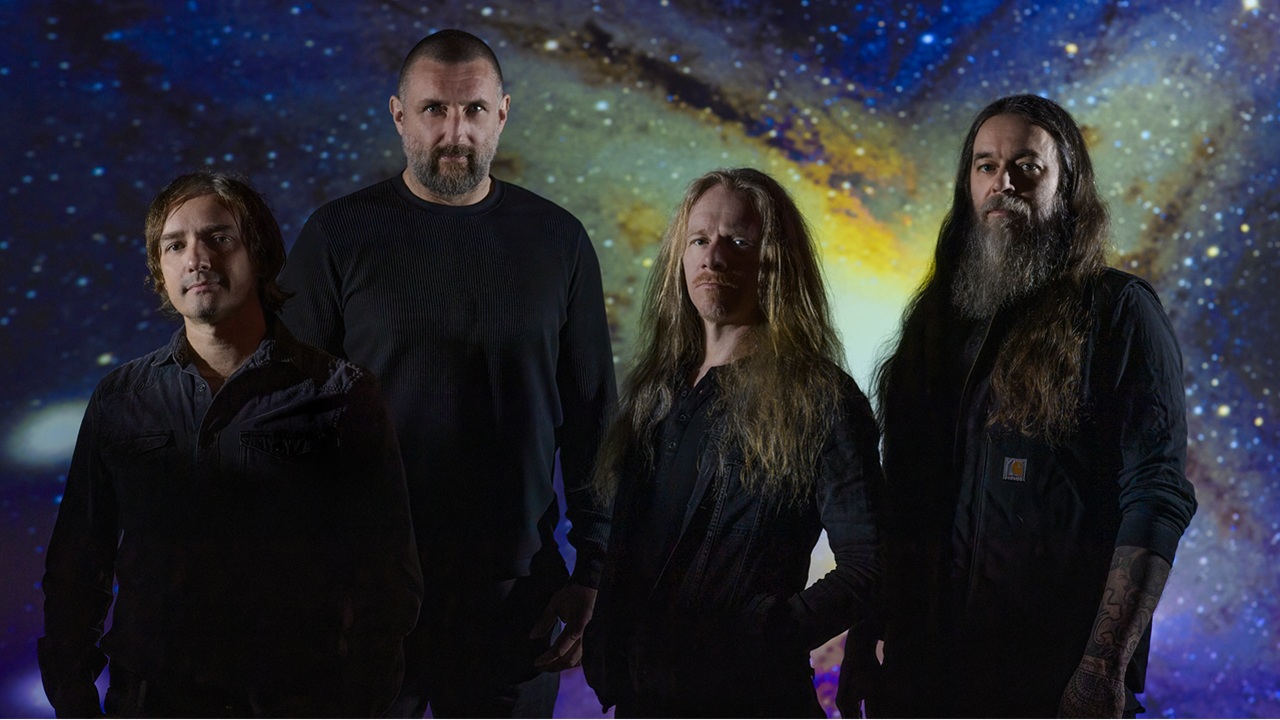You can trust Louder
What you have here are the first 15 full-length recordings by Alice Cooper, the band (’69-’73), and the solo artist (’75-’83). If you’re even halfway serious about collating a classic rock collection then you’re going to have to own six of the albums contained herein, at least. So you might as well shell out fifty quid on this deliciously vanilla, nigh-on definitive set and be done with it.
At their peak ’71-’73, Alice Cooper (vocals), Dennis Dunaway (bass), Glen Buxton (lead guitar), Michael Bruce (rhythm guitar) and Neal Smith (drums) were the greatest garage-gritty, pop-friendly, rock’n’roll band on the planet. Then Alice simply split the band up, went on to serve up the magnificent Welcome To My Nightmare and, well, loads of others… But we’re getting ahead of ourselves.
The original quintet’s ’69 Pretties For You debut is the sound of a band in desperate need of coherency and concision. An intrinsic Yardbirds dynamic, psychedelicised by surrealism and social interaction with Syd’s Floyd (the bands had briefly shared floor-space the previous year) saw artistic vision broadened beyond technical capability. Wilfully complex, it’s as hard to listen to as it is to play, but you’ve got to admire their ambition.
Zappa allegedly grew tired of his production role, passing the baton to the band who, under the tutelage of Frank’s fellow Mother Ian Underwood, managed to render Neal Smith’s drums almost inaudible. Reflected stands out from the melee, if only for the fact its chorus was latterly reconditioned for 1972’s Elected.
With Vince Furnier still yet to find his true voice or adopt his central Alice persona, Easy Action was yet another feet-finding exercise marred by unsympathetic production. David Briggs, more used to playing midwife to Neil Young recordings, considered the band’s output ‘psychedelic shit’ and simply cranked out a bland will-this-do mix, reflecting his disinterest, that didn’t do the band justice.
Love It To Death marked a quantum leap forward. Having decamped from Los Angeles to Detroit, the Coopers hooked up with rookie producer Bob Ezrin who took them in hand, disciplined their scattershot approach to songwriting and transformed their sound. In I’m Eighteen they nailed their first stone-cold classic; every-kid angst incarnate, it earned them their first Top 40 hit, while the album’s segued suite of Second Coming and Ballad Of Dwight Frye lent itself perfectly to the dark theatrics that soon became the band’s stock in trade.
From now on Vince, unmistakably the live show’s central figure, was identified in the public mind as Alice Cooper, while Dunaway, Bruce, Buxton and Smith began a slow, sure fade into the shadows. But for now, as the band delivered their second album of 1971, November’s Killer, their shared profile and firmly in the ascendant. An essential Detroit document blessed (in Under My Wheels) with one of the finest opening tracks in rock history, Killer’s virtually faultless. Halo Of Flies and Desperado both highlight further facets of the increasingly progressive Cooper muse, while the titanic concluding combination of Dead Babies and the title track, which in the live arena provided exquisite soundtrack to Alice’s inaugural nightly execution (by rope), defined rock theatre to perfection.
Sign up below to get the latest from Classic Rock, plus exclusive special offers, direct to your inbox!
School’s Out has got School’s Out on it. Track one, side one: back of the net. It transported Alice Cooper to the pinnacle of international rock stardom, but is not without its faults. Delightfully psychotic Luney Tune and climactically psychedelic My Stars are dual quasars, but Grande Finale (really?) is a big, fat filler too far.
Billion Dollar Babies is simply brilliant. There’s nothing wrong with it. It’s a gothic masterpiece, with one of the most exhilarating, over-the-top productions of all time, courtesy of Bob Ezrin (at his creative peak; his next project was Lou Reed’s Berlin). The track-list alone sells it: Hello Hooray, Elected, Billion Dollar Babies, No More Mr Nice Guy… then there’s a dentist-based mini opera (Unfinished Suite), Alice’s finest lyric (Generation Landslide) and a hymn to necrophilia (I Love The Dead) that ultimately gets our hero guillotined. Come on! Surely it doesn’t get any better than this? And no, tragically, it most certainly does not.
Bob Ezrin was unavailable for Muscle Of Love, and the cresting band thought they could do without him, and they could. Almost. Muscle Of Love had its moments, but not enough of them. Critics huffed, audiences shrugged, and Alice looked around for someone to blame. Next thing you know, he’s a solo artist. The dream, as they say, was over.
So logically, Alice re-emerged in 1975 with Welcome To My Nightmare. An album that was as much Bob Ezrin’s as it was Alice’s. Ezrin populated its dramatis personae with the house band he’d put together for Lou Reed’s Rock’N’Roll Animal reinvention of the previous year, and Alice conceptualised an album and accompanying show more sophisticated, and expensive, than ever before. Even now Nightmare’s a dazzling triumph, from Vincent Price’s cameo on The Black Widow to the fabulous Steven-centred triptych at its core, its single Only Women Bleed immediately according Alice, a once reviled pariah, total acceptance at the heart of the American mainstream. Which, in kick-ass rock’n’roll terms, heralded something of a decline.
For fans, Alice Cooper Goes To Hell was their (anti-)hero’s broadest wink at the camera yet, a message to middle America that “Hey folks, it’s only an act”. It might have been a canny move in pure showbiz terms, but was badly mistimed considering that his core constituency, the former pre-teen delinquents weaned into rock’n’roll by School’s Out, were just about to hit 17 in the year that punk broke. And, in this climate, who needed a self-confessed Vaudevillian playing at being public enemy number one when Johnny Rotten, leering from the tabloids, gave every indication of being the real thing?
For once, Bob Ezrin’s theatrical slickness only served to make matters worse and, as the rock world’s taste turned further toward gritty, urban reality, poor old, hard-drinking, out-of-touch Alice decided to make an album in the guise of a Clouseau-esque private investigator called Maurice Escargot. Lace And Whiskey is almost baffling in its camp over-slicked hopelessness. Cloying sentimental ballads proliferate (You And Me, arguably the worst, most middle-aged of them all, was released in the same month as The Clash’s White Riot. Alice went on to promote the single by serenading The Muppets with it). Wow… Time to give up drinking.
Alice chronicled his sanitarium-based battle with alcoholism on concept work From The Inside. Co-written with Elton John lyricist Bernie Taupin, the album was just as reflective as one might expect from an artist in such circumstances, but you can’t help but ache for the Alice of old as yet another slick power ballad syrups limply by.
And so it continues. Flush The Fashion, though produced by Roy Thomas Baker, seems to court new romance in places, self-consciously electronic We’re All Clones going straight for the throat of the Numan market. At least, when a rock’s called for (Grim Facts, Nuclear Infected), guitarist Davey Johnstone’s never found lacking in swagger.
The collection staggers to an ignominious conclusion with a trio that Alice himself refers to as his ‘blackout albums’, Special Forces, Zipper Catches Skin and DaDa, which to be frank, ain’t great. Unsurprising, considering Cooper has no recollection whatsoever of recording them (due to the combination of a temporary fall from the wagon and a period in thrall to freebase cocaine).
Obviously there’s a lot here you don’t need, but at the price – £49.99 – and considering all the Cooper albums up to Nightmare (here neatly housed in replica, card sleeves) are nigh-on essential, this set now stands as the best value one-stop shop for all things Alice.
Oh, and – spoiler alert – he only got better after DaDa.

Classic Rock’s Reviews Editor for the last 20 years, Ian stapled his first fanzine in 1977. Since misspending his youth by way of ‘research’ his work has also appeared in such publications as Metal Hammer, Prog, NME, Uncut, Kerrang!, VOX, The Face, The Guardian, Total Guitar, Guitarist, Electronic Sound, Record Collector and across the internet. Permanently buried under mountains of recorded media, ears ringing from a lifetime of gigs, he enjoys nothing more than recreationally throttling a guitar and following a baptism of punk fire has played in bands for 45 years, releasing recordings via Esoteric Antenna and Cleopatra Records.

